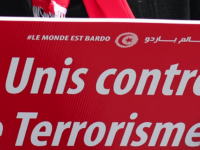The political response to terrorist attacks – particularly those involving antisemitism – now follow a fairly standard formula relying on a word salad of expressing sadness, assurances that the government stands with the Jewish community, and affirmations that antisemitism has no place in [insert country/province/city here]. While those comments often ring hollow, it is the frequent claims of “shock” that I find most disingenuous. In the aftermath of this weekend’s horrific Chanukah Massacre in Bondi Beach, Australia that left 15 dead including a Chabad rabbi, a holocaust survivor, ten-year old child and many others, you simply cannot claim to be shocked that such an incident would occur. Yet there is the Guardian reporting “communities express shock”, while EU President Ursula von der Leyen, New Zealand Prime Minister Christopher Lydon, and Norway Prime Minister Jonas Gahr Stoere all say they were shocked by the attack.
Post Tagged with: "terrorism"
Government’s Choice for Chief of Human Rights Commission Cited Terrorism as a Rational Strategy With High Rates of Success
The government’s choice for chief of the Canadian Human Rights Commission has been mired in controversy this week given his failure to disclose a record of posts and appearances that call into question the ability for Jewish or Zionist Canadians to get a fair, impartial hearing at the Commission. Birju Dattani, who formerly was known as Mujahid Dattani, is now the subject of an independent investigation by the Ministry of Justice as the calls for his resignation or replacement from stakeholder groups continue to mount, former Justice Minister David Lametti questions his suitability for the position, and MPs express non-confidence in him.
Canada’s New “Anti-Terrorism” Bill: Responding to the Courts, Not the Attacks
The government yesterday introduced Bill C-44, the Protection of Canada from Terrorists Act. While some were expecting significant new surveillance, decreased warrant thresholds, and detention measures, this bill is a response to several court decisions, not to the attacks last week in Ottawa and Quebec. A second bill – which might use the U.K. legislative response to terror attacks as a model – is a future possibility, but policy decisions, cabinet approval, legal drafting, and constitutional reviews take time.
Bill C-44, which was to have been tabled on the day of the Ottawa attack, responds to two key issues involving CSIS, Canada’s domestic intelligence agency. The first involves a federal court case from late last year in which Justice Richard Mosley, a federal court judge, issued a stinging rebuke to Canada’s intelligence agencies (CSEC and CSIS) and the Justice Department, ruling that they misled the court when they applied for warrants to permit the interception of electronic communications. Mosley’s concern stemmed from warrants involving two individuals that were issued in 2009 permitting the interception of communications both in Canada and abroad using Canadian equipment. At the time, the Canadian intelligence agencies did not disclose that they might ask their foreign counterparts (namely the “five eyes” partners in the U.S., U.K., Australia, and New Zealand) to intercept the foreign communications.
Internet Monitoring Leads to Terror Arrests
This weekend’s arrest of 17 people in Toronto on terrorism-related arrests have generated significant worldwide attention. Not to be overlooked are the reports that Internet monitoring played a key role in the investigation. According to the Toronto Star "when CSIS began monitoring the sites allegedly used by some of the […]









